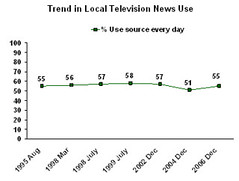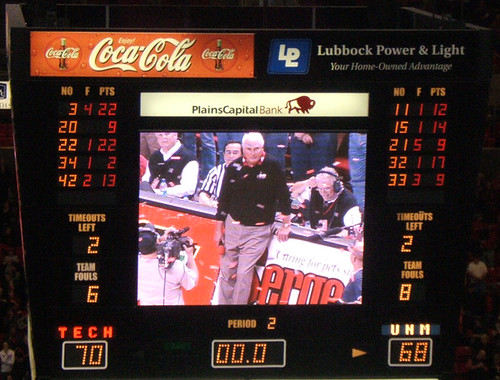Some people believe that an alien spaceship crashed in the New Mexico desert in July 1947 (
read more). Given the remote location and sparse population, few people have any firsthand experience. Therefore, almost all of our knowledge is mediated.
I thought about this while driving through Roswell on Saturday. When you drive through the heart of town, everything is tourism alien-themed. We went to the
International UFO Museum and Research Center a few weeks back (
read here). This leads to complicated questions from the children, such as "What do aliens do to you?"
My children must suffer through the academic answer. I tell them that we have very little evidence that any alien
lifeform has ever visited Earth. I do, however, spare them the mathematical details about the vast number of planets in the universe that are similar enough to Earth to support life as we know it.
The point is that
most people have an opinion about what happened at Roswell, even though none of us was there. We have learned through the media.
Let me use a more concrete example. No matter your political persuasion, you probably believe that President Bush actually
exists. However, of the 6 billion people on this
planent, perhaps 1 million have ever actually seen the man in person (including rallies). So as far as
you know, there is no real person, and all of the TV coverage takes place on the sound stage next to the one where they faked the moon landing (kidding).
My point is that we lean pretty heavily on the media to shape our reality, even though we do not think that we do. This is true with the U.S. border with Mexico.
While reading the news this morning, I came across a
CNN.com story under the headline, "
Minuteman supporters protest at Columbia University." And I have some pretty strong opinions about the U.S.-Mexico border.
In the middle of July 1992, Emily and I packed up our Chevy Cavalier and headed for Arizona. We both were born in the Kansas City area, and we had lived our entire lives in the Missouri/Kansas area. This was a big move.
My dad had taken a job in Phoenix, and we decided to try something different. "Why not go to college in Arizona?," we asked. So began this great adventure.
Living in Phoenix is great. To borrow a metaphor about Anchorage, you're only 30 minutes from the Southwest. That is, Phoenix is a massive city, and there is no forgetting that you live in a massive city. And most of the people who live there are like us and were born somewhere else.
Phoenix was big, scorching, and crime-filled. We burned out pretty quickly. So in March 1994, we went on a tour of the Southwest looking for a "better" place to go to college. I was very ignorant about what made a "good" university, so we were swayed by silly things, such as mountains and foreign language requirements.
We drove to see
Western New Mexico University (Silver City),
New Mexico State University (
Las Cruces),
New Mexico State University at Alamogordo (Oops! A two-year school), the
University of New Mexico (Albuquerque), and
New Mexico Highlands University (
Las Vegas, N.M.).
I had high hopes for Highlands. It sounded so "old west" to me, and it was my early favorite. Thankfully, however, the town is not all it could be.
UNM was a close second, but it seemed much more like an urban campus. So we settled on
Las Cruces, some 65 miles south of Truth or Consequences, where my dad took his first radio job in 1949 (irony).
The move was only slightly less random than a coin flip, but it was one of the best things that we ever did.
As I mentioned, Phoenix is
not the Southwest. It's like Chicago with
cactuses. The culture is strictly American.
Las Cruces was different. Shortly after moving to
Las Cruces, we went to the Fourth of July-related Electric Lights parade. There we sat on the side of El
Paseo Drive and watched the parade.
And we sat shoulder-to-shoulder with people who had lived in
Las Cruces their entire lives. And the residents of
Las Cruces are a majority Hispanic, according to
one estimate. This experience allowed me to gain a real appreciation for another culture -- one completely different from my
midwest roots.
That first summer (1994), I took a
NMSU class titled, "U.S. Military History" with professor
Sadler. Since his expertise focused on the border, we learned a lot about that. It was a great education experience, even if it did mark one of the two "B's" I got at
NMSU.

New Mexico State's traditional three-triangle logo (see above) represents the blending of the three cultures, Hispanic, Native American, and
Caucasian (
interestingly, I can find little documentation on this).
On this account,
NMSU was a great place to be. We learned a lot about other people with other pasts.
We also were 45 miles from the Mexican border. It was not some distant other. It was not something we knew only through the media. It was a part of our lives.
We travelled to Juarez often. I spent time off the main beat photographing the city for my photojournalism class. I learned a lot.
Sadly, however, large border towns are not especially representative. Juarez is much different than Cozumel, where I visited as a teen-
ager. You can get a better glimpse of the border if you travel west from El
Paso, Texas.
There you will quickly cross into New Mexico. Continue west on N.M. state highway 9, and you will
travel parallel with the border for almost an hour. It is an amazing experience. There is no river. There is no wall. In some cases, there is almost nothing except a small post delineating the border, which is somtimes just yards away. There is just unwelcoming desert.
Driving that highway has changed me. You spend your whole lives learning geography through maps. And those lines
look real. But they're not really real. There are artificial, politically created boundaries. I just had the good fortune to have been born on the economically advantaged side of the line.
Of course, this highway was not always next to the border. The border used to be in
Las Cruces. The small "suburb" of
Mesilla once was in Mexico. During the
Gadsden Purchase, however, it became part of the United States. Overnight, those residents changed citizenship. They said, "We did not cross the border. The border crossed us."
Those years in
Las Cruces did change me. I just do not see they border as a hard line on a map. It's a living, breathing thing. And I never would have felt the way I do if I had not experienced the entire picture firsthand.
I'm not trying to change
anyone's opinion here. Really, I'm just commenting on the role of the media. I will argue that you do not have a
real opinion about immigration if you've never been there. Unless you've stood on the side of highway 9 looking south into the unfriendly desert, you have an uninformed opinion.
Sitting in Iowa, or Minnesota, or Ohio, it's easy to have an opinion about the border, perhaps. You might see opportunists darting across a small stretch of river to take advantage of your tax dollars. But in my experience, it's not like that. Instead it's the dozens of Mexican citizens who have died in that desert looking for a better life. Trying to do jobs in a meat packing plant or cotton field that I do not want to do.
I respect your opinion, whatever it is. But before you declare certainty that you are correct, take a trip to the border. Meet some people. Drive over to Columbus, N.M. Park your car. Walk across the border there to Palomas. Talk to some people. Do not rely upon the media. Experience it yourself.
P.S. I would love to post some photos here, but all of my work then was done with slide film, and I do not have a slide scanner today.Labels: Hispanics, media, Mexico, New Mexico, public opinion











 FOLLOW SAM ON TWITTER
FOLLOW SAM ON TWITTER
 SUBSCRIBE TO THIS FEED
SUBSCRIBE TO THIS FEED
